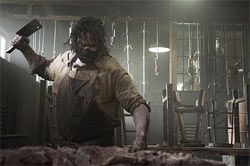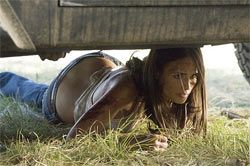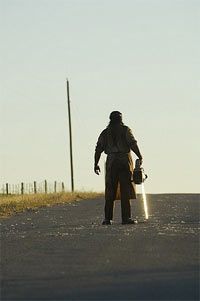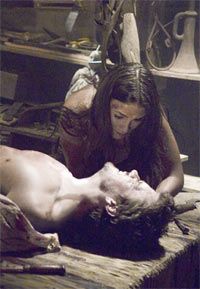On the eve of the release of The Texas Chainsaw Massacre: The Beginning, it will be clear that this film isn't just a simple rehashing of the themes begun back in 1974 when Tobe Hooper shocked the world by putting the exploits of a guy name Leatherface across on the screen. In The Texas Chainsaw Massacre: The Beginning it is 1969. The conflict in Vietnam has exploded. The toll on the United States is catastrophic, the losses immeasurable, while the draft ramps up to feed the military machine. And 18-year-old Dean Hill's (Taylor Handley) number is up. But before Dean can report to the local induction center, his brother, Eric (Matt Bomer), who has recently returned from a tour of duty in Vietnam, decides to surprise Dean. Despite the concerns of his devoted fiancée, Chrissie (Jordana Brewster), Eric plans to re-enlist alongside Dean in his beloved Marine Corps in hopes of keeping an eye on his directionless brother. Unfortunately, Dean's plans do not coincide with Eric's. Dean's simple strategy to dodge the draft and head south to Mexico is sponsored by his strong-willed girlfriend, Bailey (Diora Baird). But before either couple realizes the true battle they are about to confront, the boys and their respective girlfriends head across Texas for a final fling of serious fun.
Leatherface is an entirely different animal because in none of the films have we even gotten a hint of this character's humanity. Yet, I don't think that anybody would classify him as a mindless killer who just comes in out of the room wielding a chainsaw. With very little information, this character has given us a name, a mode of behavior, and an appliance with which he will forever be identified. In fact, where Jason, Freddy, and even Michael Myers to some degree have taken on almost comic personas (Freddy vs. Jason, Halloween: Resurrection anyone?), Leatherface seems to be the one on screen serial killer that hasn't lost any luster. He still instills just as much fear now as he did when he was first introduced 32 years ago. How to explain The Texas Chainsaw Massacre from 2003 grossing $80 million dollars? Or, the current popularity of the character (not the franchise) on DVD? Or even the fact that The Texas Chainsaw Massacre: The Beginning will probably do even better then all the other films thus far? This doesn't even discuss how the new franchise seems to all but ignore the other sequels that came after the 1974 films, with what seems not even a peep made by the legions of Leatherface fans.
With the Vietnam War still raging in 1974, The Texas Chainsaw Massacre was a film that was certainly a part of it's time. Horror movies have always done very well during heightened moments in our Nation's history because they allow us to deal with situations that might otherwise seem unbearable. By seeing all the blood and gore of the The Texas Chainsaw Massacre, viewers were somewhat able to come to terms with the cost of that bloody incursion. I am not saying that it provided any means of comfort, but it showed filmgoers something they weren't used to. It allowed them to be easy with their uneasiness.
In the 1980s and 1990s we were treated to sequels such as The Texas Chainsaw Massacre 2, Leatherface: The Texas Chainsaw Massacre III and The Texas Chainsaw Massacre: The Next Generation. This is only a theory, but perhaps with the thawing of the Cold War, and US affairs not centered around bloody battles many miles away, the franchise seemed to reflect a more laid back approach to it's subject matter. As if the US was taking a break from it's problems, so the films didn't need to be any more introspective than they had to be. Also, I don't recall any of the releases past The Texas Chainsaw Massacre 2 receiving nearly the amount of fanfare as the 2003 or 2006 films have.
Flashforward to 2003, the US is in somewhat of similar war in Iraq, and again you have The Texas Chainsaw Massacre on screens. This stylized version is different from it's predecessor, but at the same time it's ability to transfer fear and violence is quite similar. Oftentimes, when the news comes on and we hear about the mounting casualties in the Middle East, we say how bad it us, but part of us really is effected in ways that aren't verbalized. It's like the horror of the violence is better dealt with in the darkness of a movie theater, where we can be scared and if anybody sees us it's okay because usually they are just as scared as we are.
In a dark movie theater, watching a deranged being dole out justice with a chainsaw.




